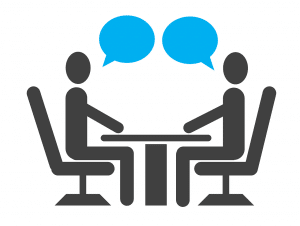There are some things you just want to be done with once you’re an adult, like braces, acne, homework, bedtimes (although you really should have those), and, without a doubt, bullying. But while the word “bully” might conjure up images of children or adolescents tormenting each other in the schoolyard, the truth is that there’s no age limit on being bullied, unfortunately. In fact, according to a 2017 survey by the American Osteopathic Association, adults are being bullied nearly as often as adolescents, with 31% of those surveyed admitting to experiencing “repeated, negative behavior intended to harm or intimidate.”
Maybe you’ve got a bully in your life: it could be a neighbor who’s always in your business, a controlling partner, an intimidating boss or colleague, a cliquey or rumor-spreading friend, a condescending family member, or even high-pressure salespeople or business owners. So what can you do? The first step is to recognize and name what is happening, then try using strategies to deal with the bullies that come into your life even in adulthood.
When Is It Bullying?
If you experienced or witnessed bullying as a kid, it was probably pretty obvious what was going on, but now that you’re an adult, you’re probably not being pushed into your locker or called names to your face. Being bullied as an adult can be more subtle, but it can also be pretty obvious, but we’re just reluctant to name it as such. So what does it look like?
Well, while bullies are often in a position of power over you, anyone can be a bully in your life – they’re usually trying to control you in some way or have some sort of power over you, and/or their behavior regularly makes you feel oppressed, belittled, humiliated, or de-energized. So, while bullying at work can definitely come from a boss who might belittle you, give you more work than others, guilt you for things like taking vacations, or constantly over-correct you, it could also come from colleagues in the form of:
- Pettiness, rumor-spreading, insults, cliquiness, or even intimidating or threatening comments
- Ignoring you, cutting you off when you’re trying to speak, intentionally cutting off necessary communication, or leaving you out when socializing
- Disrespecting your time by always being late, putting everyone else’s requests ahead of yours, or purposefully not doing things when they say they will
- Sabotaging your work, taking credit for your work, or making you a scapegoat for any problems that come up
If the bully is in your circle of family or friends, they might:
- Engage in excessive criticism
- Gaslight you, or try to manipulate you
- Constantly play the victim and guilt-trip you
- Try to control or “strong-arm” you
- Threaten you with physical, financial, or emotional harm
- Spread rumors or badmouth you
- Shame you publicly
- Initiate unwanted physical contact
When it comes down to it, you’ve just got to trust your instincts, and listen to that voice in your head saying that this relationship – no matter who it’s with – is toxic, and think about where it’s coming from and how you can deal with it.
Dealing with Bullying

So, there are a lot of types of bullies you could encounter as an adult, like verbal bullies, physical bullies, material bullies (or those who have some sort of tangible or formal power over you), passive-aggressive bullies, or even cyberbullies. Whatever their style of bullying is, it can be very damaging to you psychologically, as well as physically: experiencing bullying can cause headaches, poor concentration, muscle pain, sleep loss, anxiety, depression, frequent sick days, and decreased work productivity, and the stress of it can lead to more severe health problems, including high blood pressure and gastrointestinal issues. So what can you do?
The first thing you should remember is that the bullying is 100% not your fault, and it’s not happening to you because of anything you’ve done. In fact, while many bullies will pick on someone partly because they see that person as vulnerable, they might also do it because they feel threatened in some way by that person. After all, that old cliché that bullying comes from the bully’s own insecurities or feelings of powerlessness or inadequacy is probably actually true.
So should you feel sorry for your bully, then? Well, there’s never anything wrong with trying a little empathy, but you don’t have to feel bad for them – just use this knowledge as a way to flip the script. If you take the time to think about what the source of the bullying is, it might actually help you to take a breath, realize that the bullying isn’t about you, and then be able to have a clear enough head to implement the following strategies:
Try to remain calm (but also keep your boundaries)
Adult bullies are just like their (slightly) more childish counterparts: they want to get a reaction out of you. If you let them push your buttons, they’ll just end up using your reaction to try to expose your weaknesses – but that doesn’t mean you have to run away. Depending on the situation and what reaction it warrants, you might want to:
- Respond to them in a totally normal way, using polite, unemotional language, and always making eye contact with them – you could even smile, or if you can, try to see the humor in the situation! All of this might just throw them off balance.
- Remain completely unimpressed and ignore them, perhaps by simply walking away, or by pretending you didn’t hear their rude comment. Remember that old saying, you need to pick your battles? It definitely holds true with bullies, and sometimes just removing yourself from the space is the best course of action.
- Pay attention to your body language: relax your muscles and show that you are not intimidated or stressed by them, and again maintain eye contact.
- If it’s absolutely necessary to confront them, keep your composure, but use assertive language that maintains your emotional and physical boundaries. If they are a nonviolent bully, you can even show them that you are not afraid to call them out, and point out that what they are doing is bullying, which might put them on the defensive and trip them up. If you’re going to do this, be prepared with what you want to say, don’t attack them, and be specific about their behavior – in other words, shouting “Stop bullying me” is just not going to get you the results you want.
Don’t just sit there and take it
If your bully is in your workplace, as they often are, you might need to take action in order to make sure you’re able to function properly at work. After all, the bullying is their problem, not yours, and you have the right to be left alone to complete your responsibilities. Remember, you should never let a bully force you to even consider giving up your job; instead you should:
- Speak to a supervisor or someone in HR about the situation, as well as asking that you be moved as far from them as possible.
- Document everything by taking screenshots and saving emails so that you can back up your claims.
- Limit your contact with them by blocking them on everything except necessary work communication.
- Find out if anyone else is a victim of your bully, and form a posse, so to speak, and use the old strength in numbers trick – after all, most bullies are weak and will not want to be confronted by a group of people.
All of the above tips can also be used if the bully is in your social sphere: speak to someone you trust, document any threats or harassment, limit your contact with them, and try to band together with any other victims of the bullies (or people who are your allies).
Speak up and stay safe
Finally, one of the most important things to remember when dealing with a bully: you need to keep yourself safe in these situations, whether it’s guarding your mental health or making sure that you aren’t in physical danger. You need to speak up, and that can mean talking to:
- Your supervisor or HR rep, as noted above
- A friend or family member that you can vent to in more minor situations – remember, they might be sick of this toxic person as well
- A therapist who can assess the level of threat against you
- If necessary, a community resource or someone in law enforcement if you’re in danger

- A crisis hotline
If you’re dealing with a bully as an adult, remember that you’re definitely not alone! And while it can feel overwhelming and distressing to have the shadow of this toxic person in your life, know that you don’t have to take it. Be assertive if you can and it’s safe to do so, and hold them accountable for their words and actions – and don’t ever hesitate to speak up and get the help you need.

